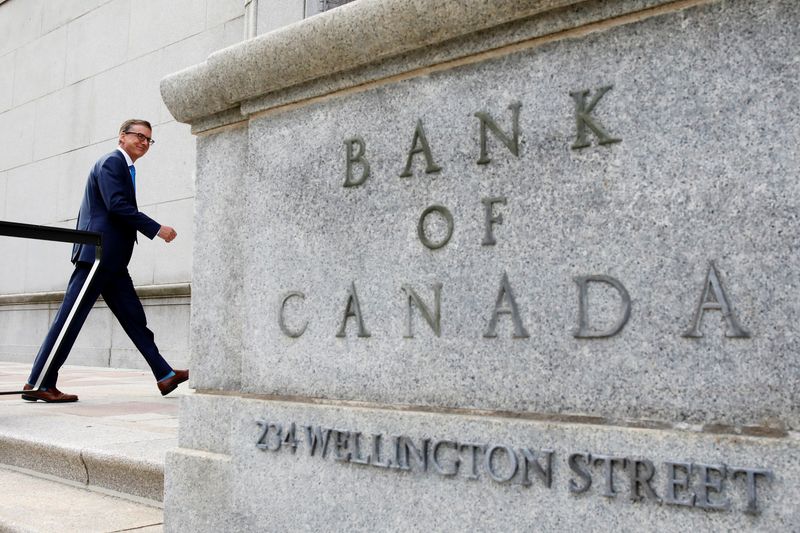By Steve Scherer and David Ljunggren
OTTAWA (Reuters) -The Bank of Canada on Wednesday left its key overnight interest rate on hold at 4.50% as expected but struck a hawkish tone, playing down market expectations for a cut this year as the risk of a recession diminished.
The Bank of Canada (BoC) also said it would take longer to bring inflation down to its 2% target than had been expected in January and that it was still prepared to raise rates if necessary.
The BoC last month became the world's first major central bank to pause its tightening campaign. Governor Tiff Macklem said he wanted to let the eight previous rate hikes sink in and would hold off on further increases as long as inflation came down as forecast.
All 33 economists polled by Reuters agreed that the bank would hold its key overnight rate steady, but money markets are pricing in 25 basis points of easing by the end of the year, down from 35 basis points before the interest rate decision.
"The implied interest rate cuts that are built into the market curve later this year don't look like the most likely scenario to us," Macklem told reporters after the policy decision was announced.
When asked whether a recession this year could be ruled out, Macklem said: "Our baseline forecast is for positive but weak growth and declining inflation."
The new forecasting document, also released on Wednesday, dropped language from January saying there was a chance for "a couple of quarters with slightly negative growth". The bank raised its growth forecast for this year to 1.4% from 1.0% in January.
"I think they (BoC) are worried that they've stalled out in terms of progress toward achieving 2% inflation and the bias is that perhaps they need to do more," said Derek Holt, vice president of capital markets economics at Scotiabank.
The BoC said demand is still outpacing supply and that the labor market remains tight, but added that after the first quarter, growth was expected to be weak. Inflation has been edging down, reaching 5.2% in February after peaking at 8.1%, but is still far above the bank's 2.0% target.
"The Bank expects CPI inflation to fall quickly to around 3% in the middle of this year and then decline more gradually to the 2% target by the end of 2024," it said in a statement.
Macklem, speaking to reporters after the policy announcement, said rates may need to stay high for a while because of sticky services prices and wage pressure.
"Governing Council discussed whether we've raised rates enough and we considered the likelihood that the policy rate may need to remain restrictive for longer to return inflation to the 2% target," he said.
Previously the BoC had been less specific about when inflation would reach target, saying it would happen sometime next year.
"There are some warning shots here" about possible tightening in the future, said Doug Porter, chief economist at BMO Capital Markets, citing the comments on demand outpacing supply and on the labor market. "On balance, I would still expect the bank to remain on hold for quite some time."

While acknowledging there were tighter credit conditions in the United States and Europe because of the recent banking failures, the BoC said the situation was improving.
The Canadian dollar was trading 0.1% higher at 1.3447 to the greenback, or 74.37 U.S. cents.